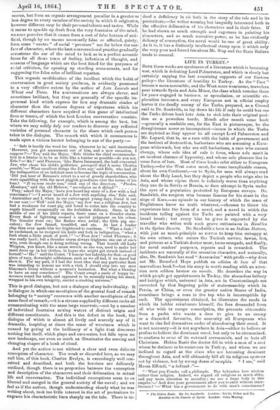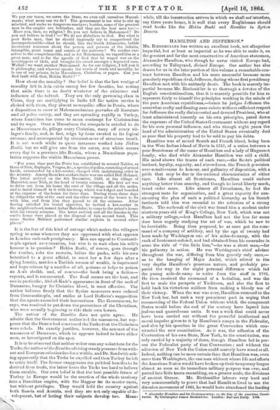LIFE IN TURKEY.* BOTH these works are specimens of a
literature which is becoming vast, which is defeating Lord Palmerston, and which is slowly but certainly sapping the last remaining supports of our Eastern policy— the literature of hostility to Turkey. As the " East" becomes more accessible, and the West more wearisome, travellers pour towards Syria and Asia Minor, the class which remains there for years engaged in business, or speculation, or scientific ex- ploration increases, and every European not in official employ leaves it the deadly enemy of the Turks, prepared, as a Consul said to Dr. Sandwith, to lay down his life if only he could but see the Turks driven back into Asia to sink into their original posi- tion as a powerless horde. Month after month some book —generally a readable one, for the East is picturesque, be the draughtsman never so incompetent—issues in which the Turks are depicted as they appear to all except Lord Palmerston and Mr. Layard, that is, as a race with the habit of government and the instinct of destruction, barbarians who are assuming a Euro- pean whitewash, but who are still barbarians, a race who cannot change, whose sole idea of rule is force, whose sole merit is an insolent absence of hypocrisy, and whose sole pleasure lies in some form of lust. Most of these books refer either to European Turkey,—for time West cares most, for some inexplicable reason, about its own Continent,—or to Syria, for men will always read about the Holy Land, but they depict a people who reign also in Asia, and whose regime there is infinitely worse than anything they can do in Servia or Bosnia, or dare attempt in Syria under the eyes of a population protected by European envoys. Dr. Sandwith, the surgeon who became famous for his share in the siege of Kars,—an episode in our history of which the mass of Englishmen know no truth whatever,—chooses to throw his experience into the form of a novel, and a novel in which the incidents telling against the Turks are painted with a very broad brush ; but every hint he gives is supported by the traveller who writes with such grave enthusiasm in Rambles in the Syrian Deserts. Dr. Sandwith's hero is an Italian Dottore,
with just as much principle as serves to keep him unhappy at his own crimes, who enters the Turkish service, fawns, lies,
and poisons as a Turkish doctor must, turns renegade, and finally, for novel readers' purposes, repents and is rewarded. The incidents are naturally of the sensation character, and naturally, also, Dr. Sandwith has read " Anastasius" with profit—why does not Mr. Beresford Hope publish an edition de luxe of that marvellous book ?—but his story is worth reading with an atten- tion men seldom bestow on novels. Ho describes the way in which people get appointments in Turkey, the shameless bribery and intrigue which, universal in Asia, are in Constantinople not corrected by that lingering pride of statesmanship which in Persia, or China, or even time greater native States of India, sometimes brings a man to the top who is incorruptible by cash. The appointment obtained, he illustrates the mode in which its holder reimburses himself, the fees demanded from all who w ish to escape conscription, the presents obtainable from a pasha who wants a dose to give to an enemy or a discarded favourite, the necessity all Europeans who want to rise feel themselves under of abandoning their creed. It is not necessary—it is not anywhere in Asia—either to believe or profess to believe the dominant creed, but only to be circumcised, to conform to some of its outward ceremonials, and to hate all Christians. Hekiun Bashi the doctor fell in with a man of a sect whom he declares to be numerous in Turkey, and whom we are inclined to regard as the class who are becoming dominant throughout Asia, and will ultimately kill all its religious systems not by violence, but by strong doses of morphia. " I am," said Moosa Effendi, " a bektash :"—
" 'What you Franks call a philosophe. The bektashos love wisdom rather than religion. Indeed, we regard all religions as much alike, and pay more attention to morality ; we are a large body in this empire.'—' And does your government allow you to exist without inter- ference?'—` What has a government to do with men's consciences ?
• The Ilekins Bashi. By Dr. Saadwith. London : Smith, Elder, and Co.
Rambles in the Deserts of Syria. London: John Murray. We pay our taxes, we serve the State, we even call ourselves Mussul- mans ; what more can we do ? The government is too wise to stir up mischief, and make us dangerous martyrs ; besides, some of the greatest men in the empire are bektashes, and they are the best men too.'—
Have you, then, no religion ? Do you not believe in Mahommed ? Do
you not believe in God ? We do not disbelieve in God. But what is poor finite man, that he should impiously try to comprehend the incomprehensible—that he should, like the Greek Athanasius, babble incoherent nonsense about the person and persons of the infinite, intangible, great cause and centre of the universe ? We confine our- selves to the comprehensible, and as for Mahommed, we regard him as a great man, and so far the apostle of God that he waged war on the worshippers of idols, and brought his sword amongst a depraved race. Wallah 1 we want another Mahommed. As for our religion, I tell you it is philosophy, and whoever speaks the words of truth and morality, he is one of our priests, be he Mussulman, Christian, or pagan. Can you find fault with that, Hekim Bashi ? ' "
How about the morality ? Our belief is that the last vestige of morality left in Asia exists among her few fanatics, but setting that aside there is no doubt whatever of the existence and influence of the bektash. They are the only governing class in China, they are multiplying in India till the native service is choked with them, they almost monopolize office in Persia, where a disposition to sneer at Mahommedanism pervades all literature and all polite society, and they are spreading rapidly in Turkey, where fanaticism has come to mean contempt for Christendom and its ways. Once a Mussulman the renegade is entitled to do as Mussulmans do, pillage every Christian, carry off every vil- lager's family, and, in fact, reign by force exerted to its logical extreme, and accompanied by circumstances of atrocious insult. It is not worth while to quote instances worked into Hekim Bashi, but we will give one from the notes, one which occurs every day in a province like Bosnia, where a Mussulman popu- lation supports the visible Mussulman power.
"For some time past the Porte has established in several Nahies, as those of Nish, Zaplagna, Vragna, &c., a species of police, consisting of armed bands, commanded by a krs-serdar, charged with maintaining order in the country. Among those krs-serdars there was one called Deli Mehmet. The latter arrived on the 8th December, 1859, at the village of Mateivtze, near Nish, at the head of twenty seimens. His first act was to drive out from his home the cure of the village and all the males, and to instal himself in it with his troop, which was lodged and boarded at tho expense of the house for three days. During these three days he obliged the wife of the cure and the other women of the house to lie with him, and from him they passed to all the seimens. After having satisfied his brutal appetites, he invited a krs-serdar in the neighbourhood, named Ashar Bairakdar, to come to the priest's house with his twenty seimens. The latter arrived, and all the females in the cure's house were placed at the disposal of this second band. This samo Serdar Mehmet performed similar exploits in several other places."
It is the fear of this kind of outrage which makes the villagers spring to arms whenever they are oppressed with what appears In London such rash precipitancy. Men can appeal to Constanti- nople against over-taxation, but who is to wait when his wife's honour is in question ? Hekiin Bashi, of course, goes through the routine, robs the recruits, bribes the pasha, sells his own betrothed to a great official, to meet her a few days after a dying lunatic, marries a Turkish woman of wealth, is imprisoned and buys release by a sacrifice of all, poisons or helps to poison an Arab sheikh, and, of course—the book being a fiction— repents, and is reconverted. The final scenes are the best, and one in particular, Abd-el-Kadr's appearance in front of the mob of Damascus, hungry for Christian blood, is most effective. The author believes firmly that the Syrian massacres were ordered from Constantinople, and smiles at Lord Dufferin's supposition that the agents exceeded their instructions. The Government, be says, was resolved to put down the pretentious of the Christians, who were actually beginning to ride their own horses.
The author of the Rambles does not quite agree. He admits that the Government authorized the massacres, but sup- poses that the Druses had convinced the Turks that the Christians were rebels. He exactly justifies, however, the account of the massacres of Damascus, which he appears indeed to have either seen, or investigated on the spot.
It is to be observed that neither writer sees any substitute for the Turks, the author o f the Rambles advising steady pressure from with- out and European colonization from within, and Dr. Sandwith ask- ing apparently that the Turks be expelled and then Turkey be left to settle itself. The former exaggerates the political benefits to be derived from trade, the latter hates the Turks too hard to believe them curable. Our own belief is that the best possible future of Turkey in Europe would be the erection of the whole territory into a Danubian empire, with the Magyar for its master-caste, but without privileges. They would bold the country against both Russia and Austria, and they are not only capable of de- velopment, but of 'letting their subjects develop too. Mean-
while, till the insurrection arrives in which we shall not interfere, say three years hence, it is well that every Englishman should read books like the Hekim Bashi and Rambles in Syrian Deserts.































 Previous page
Previous page